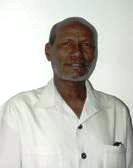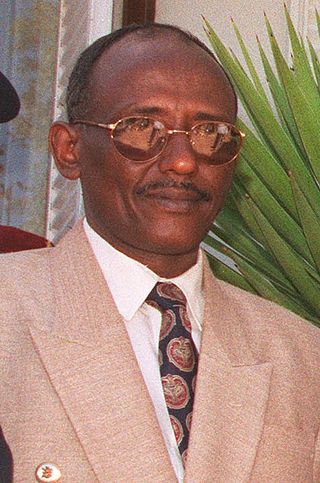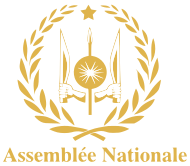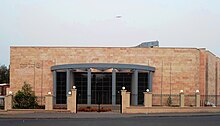
Politics of Djibouti takes place in a framework of a presidential representative democratic republic, whereby the executive power is exercised by the President and the Government. Legislative power is vested in both the Government and the National Assembly. The party system and legislature are dominated by the socialist People's Rally for Progress. In April 2010, a new constitutional amendment was approved. The President serves as both the head of state and head of government, and is directly elected for single six-year term. Government is headed by the President, who appoints the Prime Minister and the Council of Ministers on the proposal of the latter. There is also a 65-member chamber of deputies, where representatives are popularly elected for terms of five years. Administratively, the country is divided into five regions and one city, with eleven additional district subdivisions. Djibouti is also part of various international organisations, including the United Nations and Arab League.

Dileita Mohamed Dileita is a Djiboutian politician who was the prime minister of Djibouti from 7 March 2001 to 1 April 2013. He was vice-president of the People's Rally for Progress (RPP), the governing political party, until 2012. He also served as president of the Union for the Presidential Majority (UMP), the governing coalition. He was elected President of the National Assembly on 5 March 2023.

The People's Rally for Progress is a political party in Djibouti. It has dominated politics in the country since 1979, initially under the rule of President Hassan Gouled Aptidon. Today it is led by President Ismaïl Omar Guelleh and is in a coalition government with Front for the Restoration of Unity and Democracy (FRUD) and other parties. The RPP tends to hold more influence among the Issa population.
The National Democratic Party is a political party in Djibouti. It was founded as an opposition party in 1992 by Aden Robleh Awaleh, who remains the party's president. It was part of the ruling coalition in 2005, but has since rejoined the opposition against President Ismaïl Omar Guelleh.

Hassan Gouled Aptidon was the first President of Djibouti from 1977 to 1999.
Idriss Arnaoud Ali was a Djiboutian politician who was President of the National Assembly of Djibouti from 2003 to 2015. He was also the Secretary-General of the People's Rally for Progress (RPP) from 2003 to 2012.

Aden Robleh Awaleh (1941 – 31 October 2014) was a Djiboutian politician and President of the National Democratic Party (PND). He was a member of the National Assembly of Djibouti.
Ahmed Mohamed Hassan is a Djiboutian politician. He is a member of the People's Rally for Progress (RPP) and has served in the National Assembly of Djibouti as well as the Pan-African Parliament.
Souleiman Miyir Ali is a Djiboutian politician and a member of the Pan-African Parliament from Djibouti.

Parliamentary elections were held in Djibouti on 8 February 2008. There were 65 candidates running for the 65 seats in the National Assembly, with all of the candidates coming from the ruling coalition, the Union for the Presidential Majority (UMP). The opposition boycotted the election, and the UMP won all 65 seats.
Moumin Bahdon Farah was a Djiboutian politician and the President of the Social Democratic People's Party (PPSD). He was Minister of Foreign Affairs from 1978 to 1993 and Minister of Justice from 1993 to 1996. Concurrently, he was a member of the National Assembly of Djibouti.
Mohamed Dini Farah is a Djiboutian politician. He is a former minister and President of the Parliamentary Group of the People's Rally for Progress (RPP), currently serving as a deputy in the National Assembly of Djibouti.
Ali Mohamed Daoud, also known as Jean-Marie, is a Djiboutian politician and the President of the Front for the Restoration of Unity and Democracy (FRUD). He is currently a member of the National Assembly of Djibouti.

Ougoureh Kifleh Ahmed is a Djiboutian politician who served in the government of Djibouti as Minister of Defense from 1999 to 2011. He has also served as Secretary-General of the Front for the Restoration of Unity and Democracy (FRUD).
Ahmed Boulaleh Barreh,, also known as Gabayo, was a Djiboutian politician. He was the Vice-President of the People's Social Democratic Party (PPSD) and a member of the National Assembly of Djibouti.
Mohamed Ali Mohamed was a Djiboutian politician of the People's Rally for Progress (PDP).

Parliamentary elections were held in Djibouti on 10 January 2003 to elect the National Assembly of Djibouti. The ruling coalition of President Ismail Omar Guelleh won all 65 seats in the election, defeating an opposition coalition.

Parliamentary elections were held in Djibouti on 22 February 2013. After their boycott of the 2008 elections, opposition groups contested the elections as the Union for National Safety alliance.
Safia Elmi Djibril is a Djiboutian politician and women's rights activist.

Parliamentary elections were held in Djibouti on 24 February 2023 to elect the 65 members of the National Assembly.











